He has about 30 thousand hours of navigation and 18 years on board ships.
Nowadays he says that there may be someone who likes the Navy as much as he does, but more than he does there is no one. With a sense of state, the first time he smiles openly is almost at the end of our conversation, when he declares his faithful love for the Navy.


I met him in his office, which he says is “possibly the most beautiful in the country”.
It is a bright room, despite the wood paneling, and it keeps the story of the departure of King D. Carlos, who used the place as a holiday home and to go hunting, and the attentive gaze of another King, D. Pedro V who, with his wife Queen Dona Estefânia, rebuilt the Alfeite palace. Their presence still lingers in this room. In those days, they saw the Alfeite basin from the window, and today they continue to fill the history of the country with deeds that denote the bravery of a people who have always faced the sea.
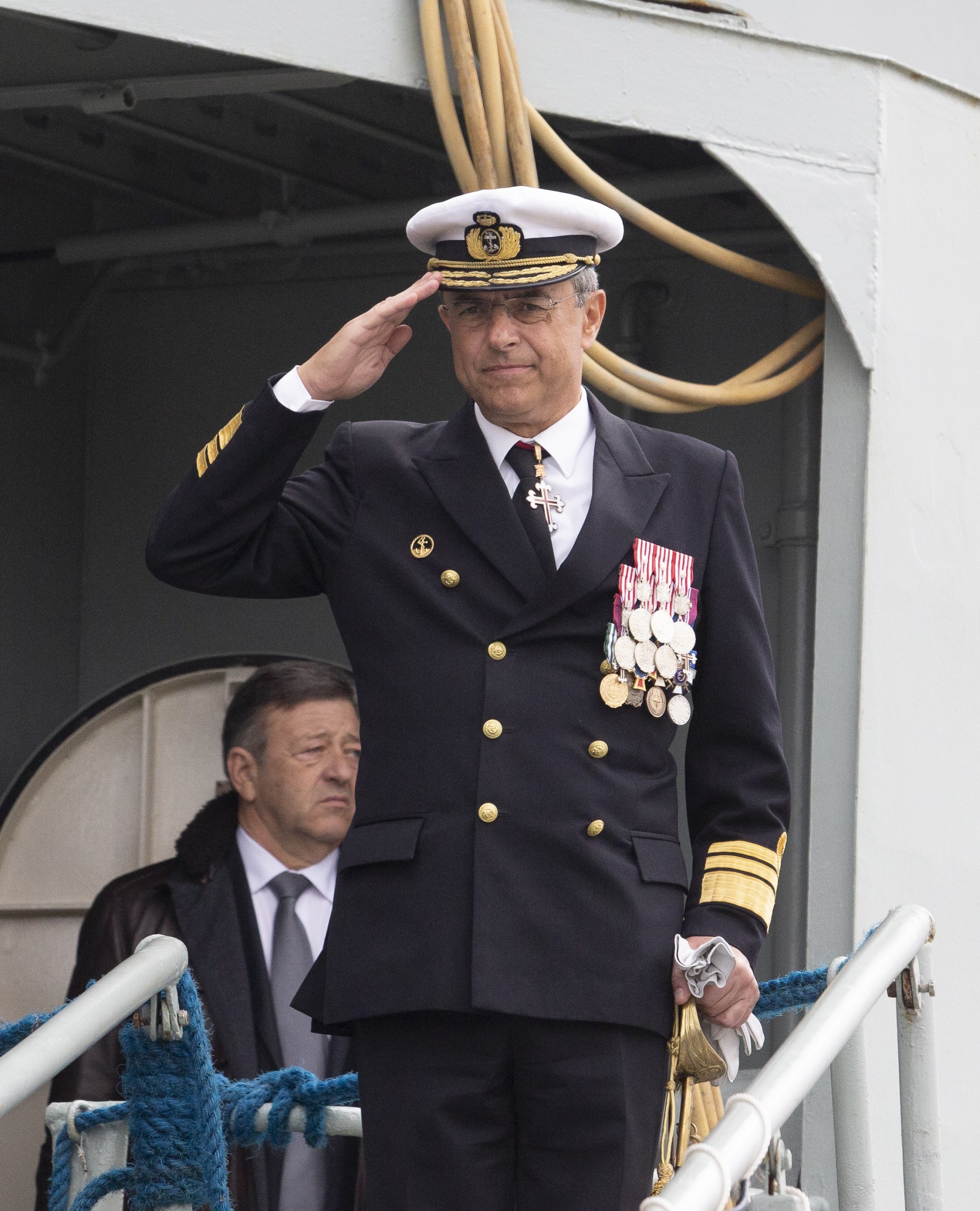
He is Vice Admiral and the current Naval Commander, Alberto Silvestre Correia. He follows Vice Admiral Henrique Gouveia e Melo, and took office this year, in January, in a ceremony chaired by the Chief of Staff of the Navy, Admiral Mendes Calado.
Accustomed to leading frigates and naval forces on international missions, as Commander, he is responsible for designing the operational planning of naval forces and units, marines and divers.
In practically a year of lockdown, the question is: given the loss of control caused by the pandemic, how to manage human behaviour in chaos?
A team leader, the years and training he has had have given him a solid leading ability. Active leadership, especially in chaos. But how can one lead like that and what discipline is necessary for that to happen?
To understand such a leader, who will soon be part of a leadership training group, Operating Theatres Leadership and Perioperative Practice Management, we went looking for the man behind the command. Any existing prejudice was immediately dispelled, and we should not believe that emotion belongs only to the most fragile.
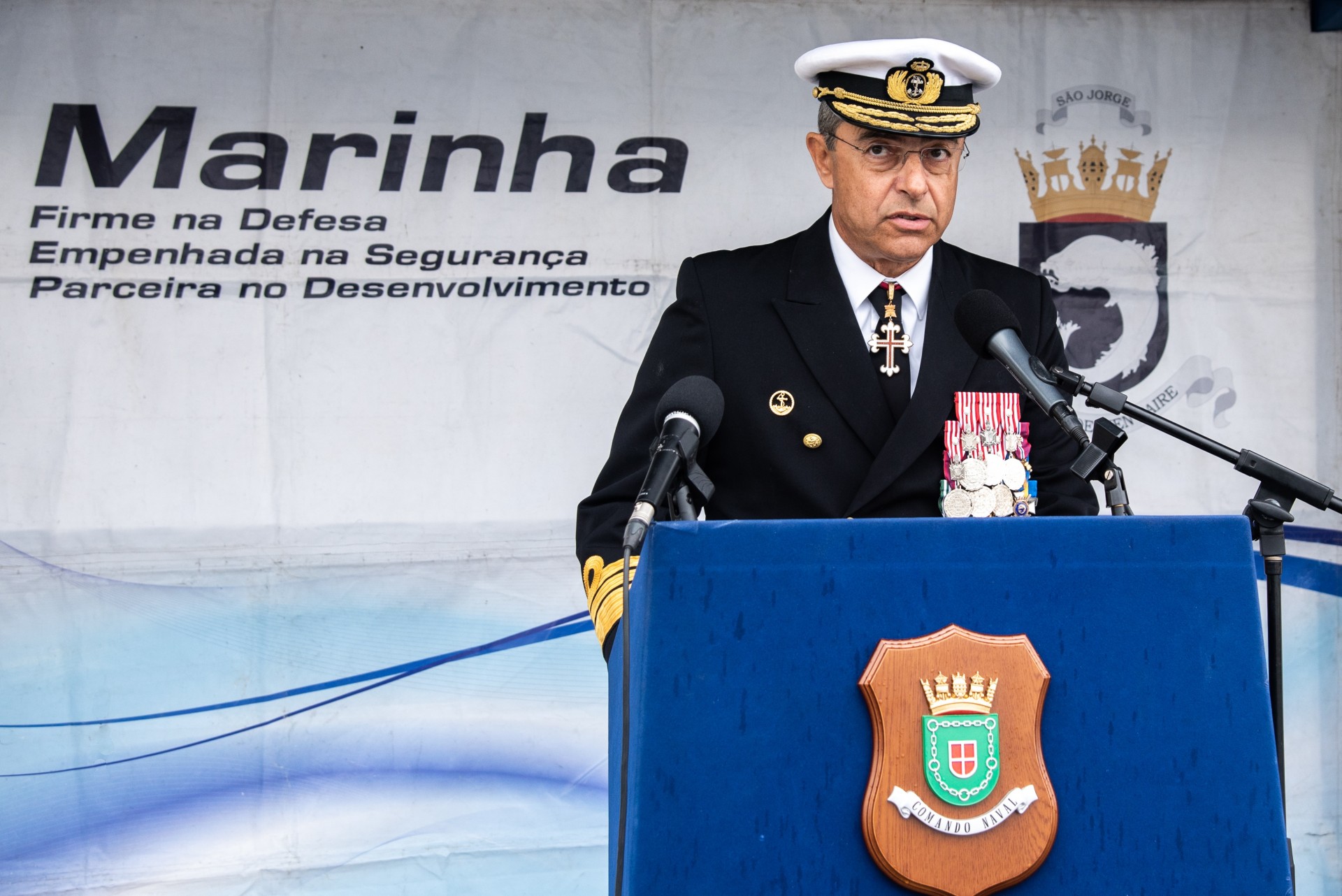
Born in Abrantes, Alberto Silvestre Correia’s father was a military.
He completed high school in 1976, when the country and education were adrift, still a consequence of the April Revolution. Strikes were more prevalent than classes and, despite the high score he had obtained in school, he knew that he lacked the bases to be as intellectually prepared as he wished to undertake higher education. He then decided to study by himself, an important method for the son of an Army Officer.
He wanted to stay connected to agriculture and study for a degree at the Agricultural School, but his father thought that the role of a man of the land did not fit him and the truth is that he was not mistaken. The boy from Ribatejo would become a man of the sea. After performing civic service, he entered Engineering in 1977, at the Higher Technical Institute.
There was no navy tradition in the family, but his father posed him a new challenge. He should also apply to the Naval School, because the level of demand was high and the preparation would be up to the man who he wanted his son to be. After a very difficult exam, he ended up there. His grade, although lower than the one he was used to, allowed him to enter the Navy, giving up Engineering.
He stayed there, and whoever listens to him may think that he did not take the Navy too seriously. It was not the case, but with a strong personality and being a man of convictions, he realised that the pedagogical system valued the functions too much and forgot part of the essence of people. His hostile style describing those times does not show in his face, which does not mean that he does not keep the structures that reason has taught him to keep properly in place.
When he was a boy, he played football and roller hockey. Before starting a match, his nervousness was almost fear, which means the possibility of failing, but which encourages leaders to go to the arena even more. That was why, in the face of the facts and when he started playing, he forgot everything and did his best. Adrenaline was already showing him what he was going to be and, therefore, he did not bend. He continued to sail towards the high sea, with no firm land to hold on to. It was a path for leaders.
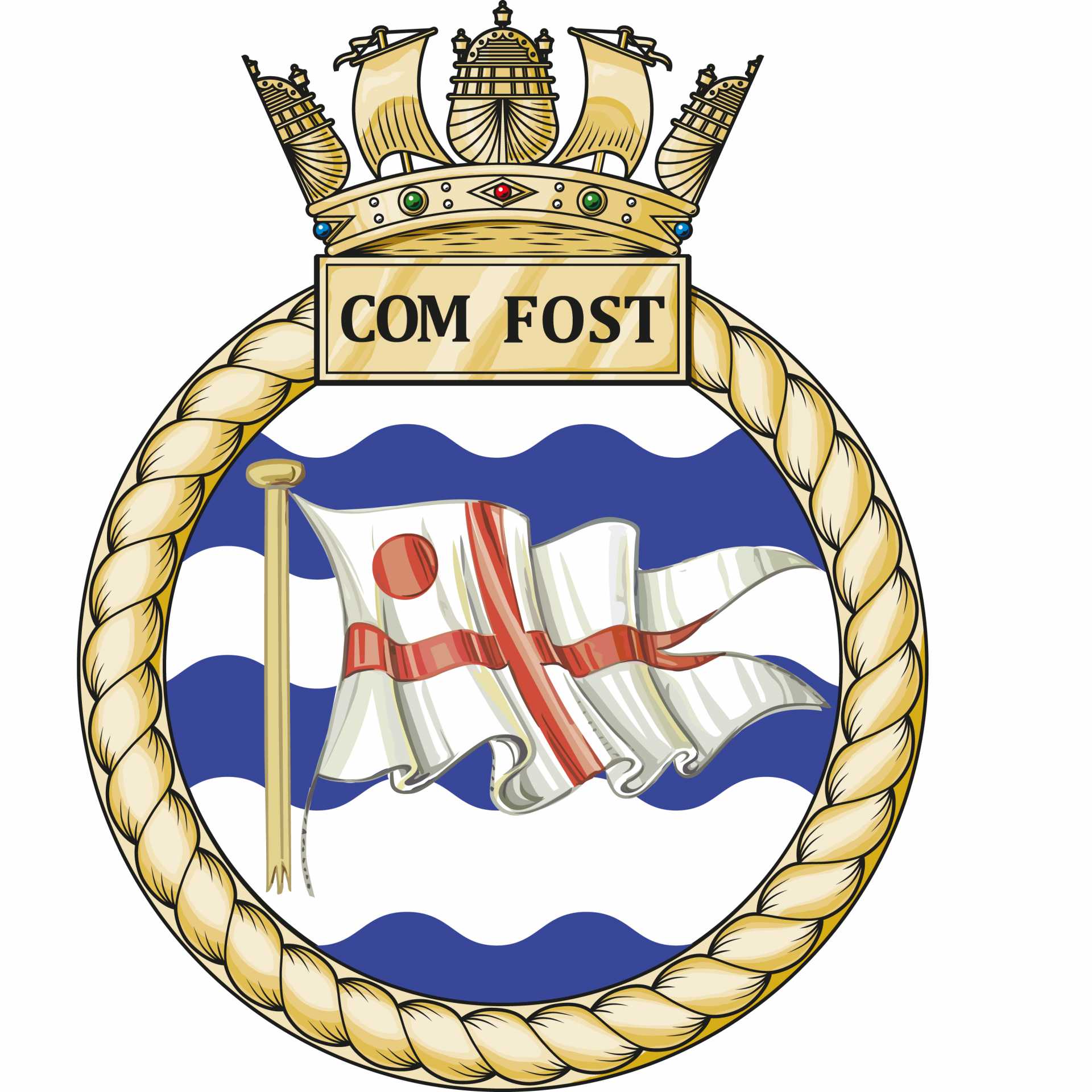
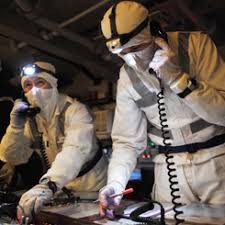
He gained leadership skills while training in England at the Royal Navy FOST (Flag Officer Sea Training). These are the acronyms of what his training consisted of, simulated scenarios of such extreme chaos that, after a month and a half, upon completion of what was his first certification training cycle, he had lost 20 kilos.
Denoting nobility of character, he thinks that one can only ask someone to do something, when he himself has already performed that same task. He recalls, without giving details, the physical and psychic hardness of his early 20s, when he was subjected to greater sacrifices. Today, he remembers what he went through and decides not to replicate it in others, an exercise in humility that power sometimes tends to blind.
A catholic, he does not practice his religion, although he respects all creeds. None causes him entropy, as long as practices do not become fundamentalist. For him, faith is something he calls "lucky star", to which he thanks silently and alone, when he travels to the Fátima Sanctuary, not to pray, but to meditate and to show gratitude.
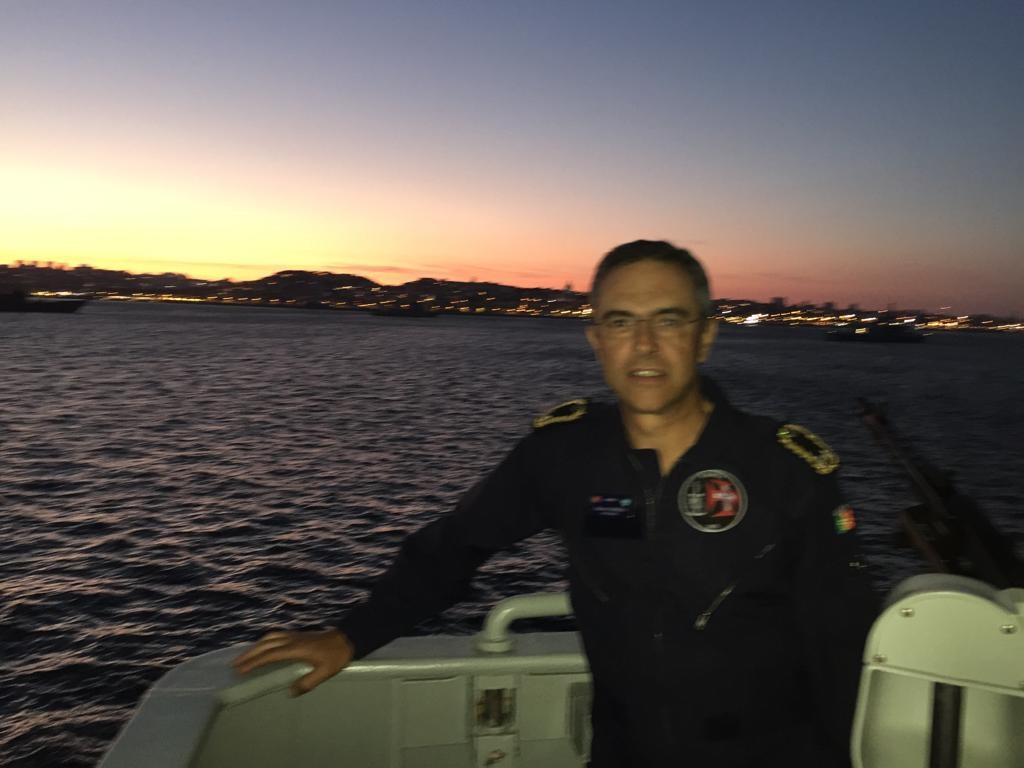
How to balance the spirit of the Vice Admiral, who has commanded teams on arduous missions and managed armed conflicts, and the spiritual man, who feels the pain of those who have already left without the right to glory?
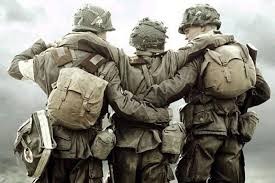
Currently watching a war series, Band of Brothers, which portrays the Normandy invasion, he recalls the balance between bravery and human fragility. When he served in Brussels and driving to Portugal, he decided to visit the beaches where the Allied troops disembarked.
Protagonist within a time that was not his, he says that he felt the war scenario as if he were part of it, "I imagined the 7,000 ships sending boats and howitzers, I walked through the fortifications and in the undergrounds where the Germans were". He went to the American Cemetery above Omaha Beach (the beach which, on the morning of 6 June 1944, was the scene of a bloodbath for the allied troops and where the cemetery is located) where about 10,000 Americans, whose average age was 21, were buried. “Some did not understand what they were doing, why, what for”. Later on, he realised the importance of knowing how to give these answers to teams.
A man of the sea, he has sailed it for as long as he can. However, entering rough waters is like entering the office, despite having had a small recreational boat and been on a trip on board a cruise ship. Sleeping in deep waters only happened during missions. Now, he sees the sea in the distance, often while walking to Guincho, because he lives in Oeiras. Every time the sea is rough, he thinks "I'm glad I'm not there". He went through big storms that stirred every particle of his body, "when the ship rocks, it rocks for everyone in the same way", he says. He noted that living in a tight space had two overwhelming effects, either an unshakable friendship of a lifetime, or the misfortune of having to see the same (unwanted) person every day. But, even regarding the unwanted relationship, he says that these were the people who taught him how to become better.
What the Navy gave him was much more than he ever expected, due to the people he met, the places he saw, and the leadership experiences he had. He corrects me when I call him a man of the world, stating "I only went east to the Meridian of India, I never went beyond that". In fact, he has travelled many places and led many lives.
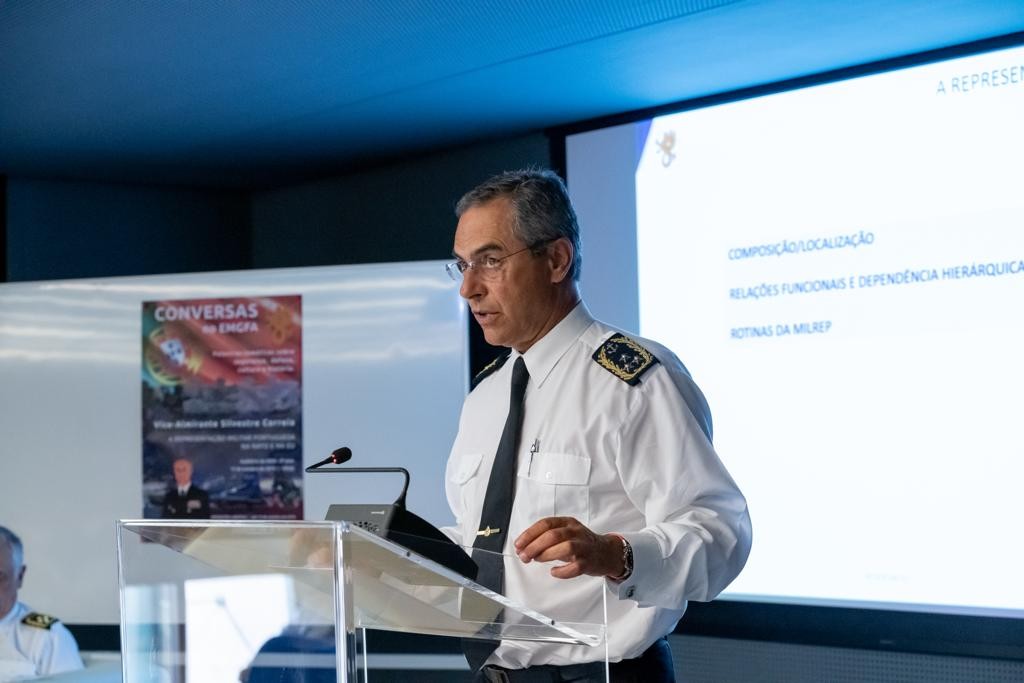
Given the pandemic we are experiencing, there was no time to plan anything. We found ourselves confronting a faceless enemy that did not give us time to prepare strategies. It appeared quietly, slowly invading our space. How do you fight an invisible enemy?
Vice Admiral: It is a different combat than the one that, even we military, we can equate in our most unlikely scenarios. We are prepared to deal with enemies that have no face, such as terrorists, whom we do not know. We do not know where they come from, how they can disguise themselves. We now see this virus as a faceless being that disturbs us and make us confuse the basics, the foundations for our existence, as we conceived it. In other words, none of this was predictable, even for us military personnel who deal with the strangest scenarios. Although someone, from the movie world, managed to produce a film that foresaw a possibility like this one that came to fruition and created chaos. Chaos is exactly altering radically principles and assumptions, which we know how to deal with and for which we train. Here the scenario was completely subverted to something completely unknown that generated widespread confusion. People are bewildered because nothing they have learned nor their skills can solve the problem. It is then that we have to improvise and that requires experience, intelligence, a sense of opportunity. It means not losing your focus, knowing how to redefine priorities according to what we are going through, being rational. It requires putting rationality on top of everything and emotionality disappear completely. I imagine that in a scenario of chaos, from a medical point of view, one will also train. For instance, in a garrison, the crew of a frigate has a total of about 200 men and women. If this frigate is impacted by a surface missile, the average casualty forecast is about 35%- 40%, that is, about 75 to 80 are casualties. This does not mean that they die, but they become unavailable for combat, needing medical care. Even the others who survive are in a state of emotional shock that needs to be dealt with. And are we prepared for that? Of course we are not! But we thought of it and the fact of thinking beforehand helps to react, when there is no time to think about a reaction that we must have. So training is very important.
Can preparation for chaos be trained?
Vice Admiral: We do various certification training for warships. One of them is done in England and the scenarios are often more demanding than what we find in reality. We are driven to exhaustion from an emotional point of view, because chaos leads to emotional exhaustion and people have to continue to be able to react under a lot of stress. They have to give up the basic principle, which is to fulfil the mission, and start to reformulate everything to just survive. To give you an example: We had three levels of ambition, depending on the seriousness of the situation. When we have the ship ready and with the trained crew, we will fight. If the ship suffers an impact, is stricken by fire, or flooding, if it is hit by a bomb, missile, or torpedo, even if I am no longer able to fight, we will try to make it move to get out of there, to try to repair malfunctions. And if we can't get out of there, we try to keep the ship afloat. In other words, this means that we have to adapt our level of ambition to the circumstances we are experiencing. We must use what we have available, in an absolutely rational way, inexorably accepting the losses that we have already suffered, and those that we are going to suffer. If a person lets himself be emotionally affected by the environment, sees one of his best friends dying, bleeding to death, we must continue to fight. Or we have to keep trying to put out the fire, or stop a flood, so as not to sink, so that we don't all die. This is chaos. Abandoning the ship is one of the most extreme chaos situations.
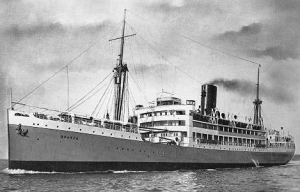
Has this ever happened?
Vice Admiral: Not with us, but in the past, we lost ships in India, the NRP “Afonso de Albuquerque” and the “Vega” Patrol Boat. All the members of their garrisons perished, and the ships continued to fight until sinking or stranding. Since there was no way to survive, they decided to continue fighting and die with dignity. This is an ultimate case. More recently in the Falklands, the Destroyer General Belgrano, which was the best Argentine ship, was torpedoed, in circumstances that I think should have been avoided today. However, at the time, and in a climate of war, logic and rationality prevailed, which is very different from what we are experiencing now in a pleasant conversation. When other values are at stake, things are different. Nobody kills anyone for the pleasure of killing. People kill to fulfil an objective and not to be killed. In practice, this is what happens. These examples illustrate what goes through people's heads, in situations of chaos, which is dying, or killing, or something that no one knows. In these cases, there is a logic that stands above the most elementary humanistic values that we all have. You know, the military are also human, they have emotions... (he is pensive)
And how does one train to deal with any emotion?
Vice Admiral: My confrontational experiences are fortunately limited to situations in the Indian Ocean, in the fight against piracy. In 2011, I led a European Union force in the Indian Ocean, where I was responsible for 9 ships of various nationalities and 5 patrol aircraft. I had confrontations with the pirates, but it was a force of unequal proportion, we were much more stronger, although with several limitations to using this strength - the Rules of Engagement.

Why?
Vice Admiral: Because when we caught the pirates, they usually held hostages, and if we sank the ship, we would kill the hostages. Or, if we got too close and they felt in danger, they would begin to torture the hostages. And we had, of course, snipers to target these pirates who were out there, but there were others inside, who would kill the hostages. Many times I had to retreat, even though I had more strength, but the mistreatment that was being inflicted on the hostages was not acceptable. There were situations when we had to use force, circumstances that were less peaceful for us. Did we manage to reproduce the chaos environment in internal scenarios? We did. There are training exercises for that, like filling ships with smoke, making them lose lighting and their ability to produce and distribute energy. Ships lose their ability to self-propel, to fight and the only thing we can do is to treat the wounded and prevent more people from dying. All of this is practiced in earnest and with an intensity that psychologically affects a lot.
How long did you train for in order to lose 20 kilos in one go?
Vice Admiral: These are certification training cycles that take one and a half months each. I slept on and off, as I used to say (laughs). There are exercises designed precisely to train the ability to react to an enemy, and to increase the resilience of a ship in the face of a situation that is absolutely unfavourable to it. We have completely lost control and we have to recover it, in a completely chaotic situation, with people dying, fires, floods, with so much smoke that one can see nothing inside and we have to get the ship out of there, or else we will all die. This is naturally a scenario that requires us to be everything: firefighters, doctors, rescuers and sailors. We do everything. And why is all this trained? Because one can't think "if this happens, I'll think about it later". No, this is completely different. If we train the reaction to something we have already thought about, it makes us create mechanisms that allow us to decide in a certain way, with priorities, redefining the objectives. All in a reasoned way and taking into account all the elements that affect our ability to get out of there. So we don't die.
Does this mean that improvising can also be practiced?
Vice Admiral: I tend to say that improvising requires a lot of work. (laughs) Luck is also a lot of work. Often people attribute the success of something to luck, but no, most of the time that "luck" has been trained a lot. The ship's commander is always thinking "what if". He gives his instructions to get his teams to work, to achieve what he wants and then, he is the only one who is thinking ahead. He sees what no one else is seeing, and if he doesn't, then he is not a good commander. He must think of all he needs to do if something happens. And we cannot be optimist, or conformist, to the point of thinking "this" is not going to happen. It can't be like that, I have to think and know, in each scenario, how I'm going to react.
We have this trained for combat, with indicators that associate with certain actions. If I have a certain indicator on the radars, I know that I will be hit by a missile or a warhead. So, for each kind of situation, I have to know how to react and which procedures to use. If I have all this trained and tested, and if faced with an unfavourable emotional state and never having experienced a situation, I do not know how I will decide. But, if I have already tested it and thought of all the possibilities, however remote they may be, I will react better and with all my capacity. In all circumstances, in all the ships that I commanded, whenever there was a briefing for any situation or action, there were always three things that should result in the completion of my guidelines: what was my “goal”; what were my “priorities”; and what were my main “concerns”. The ideas are clear in my head! And we learn to get ideas in place by defining what the mission is, and knowing what we want from it. Sometimes the reason is difficult to explain, but for those who have to perform it, it is essential because people have to believe in what they are going to do. They still have to know "what for" and what the priorities of the commander are, like a chief surgeon in an operating room. There may be similarities here. All those involved should know the priorities and what can be a risk to the success of the operation. For me, the most important thing, particularly in a chaos situation, it to be able to distinguish what is important and what is urgent, which will not necessarily be coincidental, except for the situation of "chaos". Graphically, we can translate this into an axis of coordinates and abscissae. On the one hand, we have the emergencies and on the other the importance. In circumstances of chaos, we will always be deciding on everything that is very urgent and very important.
But the commander must always be ahead of what is not yet urgent. Because when one is already in that situation when everything is very important and very urgent, one will surely make many second or third best decisions, probably wrong ones. And, we Portuguese have the habit of, instead of deciding with time, deciding at the last minute, when there are no more alternatives and everything is very important and very urgent. All of this leads to more chaos and not to its resolution. Chaos can only be prevented if we are always ahead of what will then be decided, thinking about the important things in time before they become urgent.

Isn't thinking ahead synonymous with tremendous loneliness?
Vice Admiral: (He hesitates to answer) There is a certain idea that the commander makes the decisions alone. This is a bit of a movielike idea, because decisions don't have to be lonely. Now, of course, there are times when this loneliness is desirable, so that we can think. After listening, then we need to think, to meditate, to evaluate everything. After adding the inputs, we will decide. And then yes, the decision is a lonely process because the responsibility falls on the person who decides and not on the group that helped with the decision. But this decision-making process does not need to be time-consuming, I never needed a great deal of isolation for that.
I like to have my moments to think. Those times when I can play golf, or I read, listen to my music, to meditate on something that is worrying me. But I am not a lone wolf. (Smiles) The more a person is able to involve his subordinates in the decision-making process, the more it helps them to believe in the merit of a certain path, which makes people more involved and united. This is because they are doing something they believe in. But, it is important to make it very clear. At the beginning, whatever decision is made, although it has the agreement of all, the responsibility rests solely with the decision maker. This is very important, and people understand it. People need to believe in their leader, even when he doesn't have to say that he is the leader. Leadership is not something one learns. Or rather, I would say that in 80% of a leader, what he has is innate to him. Either you have it in you or you don’t. Then the rest is learned, usually from mistakes. This also means that there is little point in making a leader out of someone who does not have those characteristics or skills, because those people will always be more insecure, or afraid; a leader needs to have courage. Courage, is what? Believing in the purpose and merit of the objective, of the mission. It is to be available to risk what in other normal circumstances, the "ordinary" person would not accept losing. Courage is to reach the limit and look at yourself (points to his own body) and say "I can go". And what do you get out of here? A lot of spiritually, but there is another aspect. People have to act upon noble goals, something they really believe in. It is this courage that makes someone, even if he does not have the innate assertiveness characteristics, become a leader, if he himself has his convictions and manages to transmit them to the people who have to accompany him, whether they like it or not. And it is difficult to be able to convince people, because the level of demand of a commander and his motivation, is necessarily different from the level of motivation of a sailor.
This principle applies to all leaders, even in an operating room. The surgeon who leads the team should prepare it for all scenarios, exercising the reactions he considers most appropriate for each one in a contingency and loss situation. The key is to train and not to be afraid to exercise our skills, assuming our responsibilities and taking our emotions away, whatever the reality or operational scenario. Let us return to chaos. Here, there is no room for emotion when we have to act, because otherwise we are left to mourn the losses. If we do, we will not only have more losses, but we will not be able to decide properly. What is lost is lost, but decisions must be straightforward. We will cry later, not now. At military level this has, in fact, concrete rules, one of which prevents people from the same household, or with whom there is a family relationship, from boarding.
It makes sense.
Vice Admiral: Yes, it does. But the opposite has already happened to me. As a General Officer I led a NATO force in 2015, and my flag captain of the Portuguese ship was my brother.
But can this happen?
Vice Admiral: Yes, but it is unusual. In fact, my brother had already been chosen as a flag captain and only afterwards the Admiral of the Chief of Staff of the Navy (the CEMA is, inherently, the National Maritime Authority of Portugal) spoke to me to find out if I was available to command the force. I accepted, of course, I was always available to go to the sea, mainly an international Portuguese command force. We assessed the situation of my brother being on another ship and, although unusual, we agreed that it would be ok, so it was possible. When I arrived in England and introduced myself to my superior on land, he noticed the similarity of names and we ended up talking about the fact of having a brother on the Portuguese ship. I remember perfectly what he told me. It was an intense period because we were going to the Black Sea, and he said "after this intense period that you will go through, either you will never get along with your brother again, or you will be better friends" .
Did you become closer?
Vice Admiral: Yes... (he becomes introspective). Yes, it went well. We lived things that... (he pauses)
Only those who are in these groups understand what it feels like as a team?
Vice Admiral: When a person is fighting, or involved in a certain action, if there is a fire, a burst in an area of the ship, which we can identify immediately, and we know consciously that our son, or brother, is there, that person ceases to fight. He is emotionally affected and stops thinking rationally because part of his attention is focused on this person, who may be in trouble. This greatly compromises good performance.
Did you face this situation personally?
Vice Admiral: No, fortunately, because we didn't go into combat.
We are talking about courage, training to become more rational and refine that same courage. But what about fear? Is there fear in this equation. Or not?
Vice Admiral: Of course there is, and if someone says they are never afraid, they are lying.
Where does fear fit in?
Vice Admiral: It is curious, before we start to perform certain actions, we feel the fear. Afterwards and while you are in the middle of the action, you only focus on what needs to be done. There is a defence mechanism in our organism that enables us to be there in full. Adrenaline is precisely for that, it gives us strength and unblocks the emotional sector, making us react coldly to something that has to be done. But, it is important to understand why we are fighting, it helps us to get out of our emotional cocoon.
Have you ever been close to an explicit chaos situation?
Vice Admiral: (He sighs and remains silent)...
With your own team?
Vice Admiral: Yes. In dramatic circumstances when I was almost lost the ship. But I didn't lose it. We train to limit the factors that we do not control and that is what training is for. Yet there is a slight percentage that no one can predict. And, if that percentage happens, there is nothing that we could have foreseen to prevent it, because it is part of the group of the unforeseen and that is the point where we may not have an intellectually valid solution. And then... there's a little star that matters. Churchill said there was no luck, only a lack of concern for the details. I do not share his opinion. There is always the aspect of unpredictability that we cannot control or predict and there is something that happens due to luck, or divine force... probably... I don't know.
Do you believe that there is something divine that gives us such luck?
Vice Admiral: I believe that there is something that transcends us and that we do not know how to explain. And, no matter how much one defends, or is against or in favour, nobody knows how to justify why something is happening. I myself feel that I am illogical in this part of my feelings. In other words, I feel something, but when I try to translate it rationally, I can't do it. I do this exercise more as an introspection. I had moments on board, when things were going well for me, when I needed to be thankful. I had to be grateful for what had not gone wrong and what could have happened, because I had no ability to interfere. I had many situations when I had teams thousands of miles away and I gave an order that I knew could have bad consequences. The end result worked and I was internally grateful.
Do you miss being at sea?
Vice Admiral: (He laughs, with a very light look on his face) I have spent many thousands of hours at sea and I really enjoyed being in the sea.
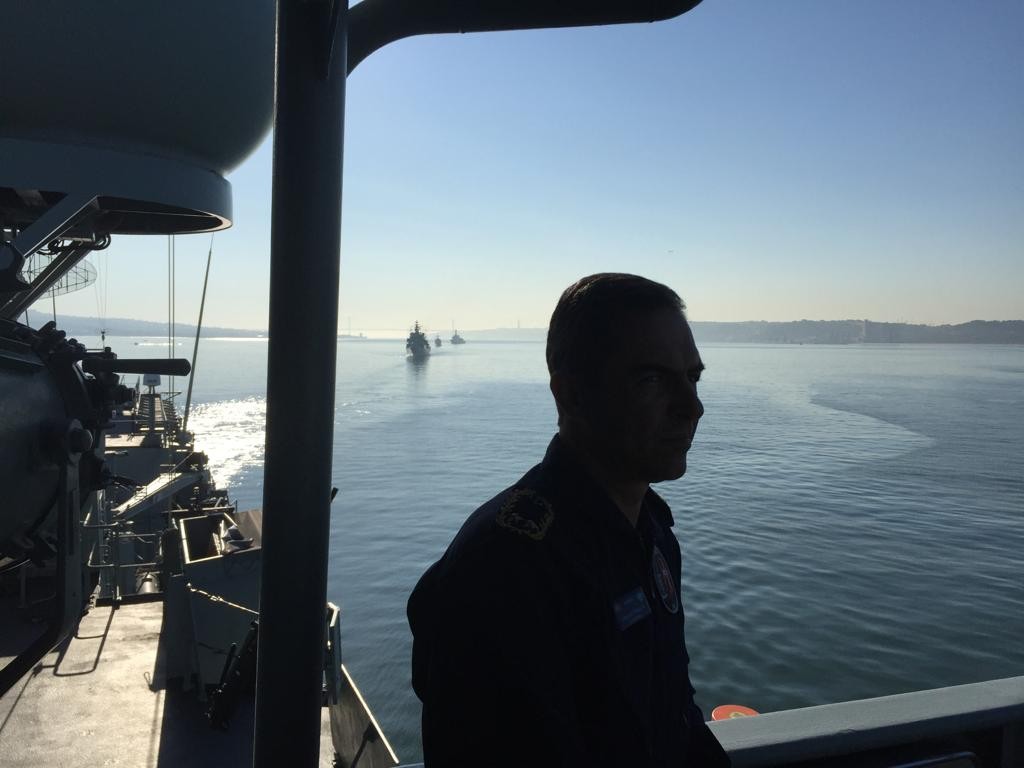
Did you have the ambition in your career to get where you are now?
Vice Admiral: It crossed my mind that I could get here, but I didn't set it as an objective. That's why I was never disillusioned, because the truth is that I was never deluded. This is a very stimulating place because we do what we like.
Joana Sousa
Editorial Team


